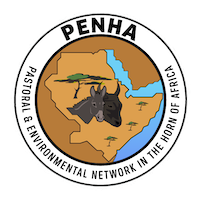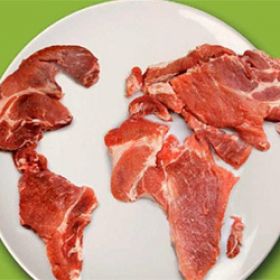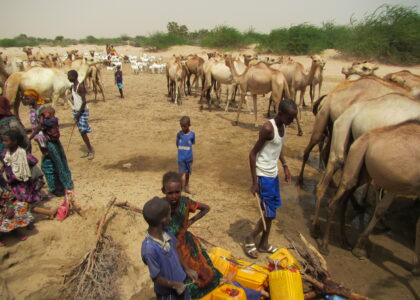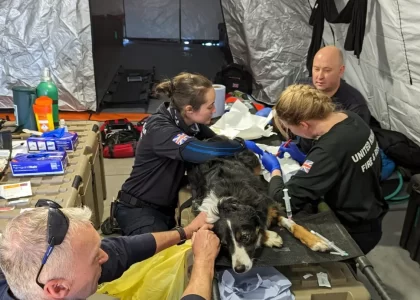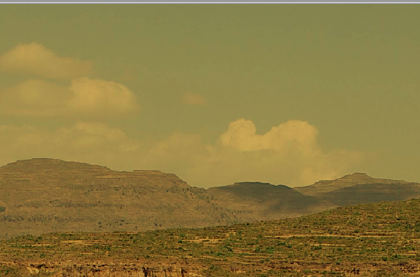By Jennifer Eddis
A recent report jointly published by the Heinrich Boll Foundation and Friends of the Earth Europe aims to shed light on some of the facts of the production of meat and dairy products to provide facts to consumers so that they make informed decisions about the food that they eat.
The report does not claim that people should stop eating meat; it calls for an awareness of the impact that our eating choices have on the environment, on farmers, producers, and the welfare of animals. Crucially it aims to highlight an urgent need to bring about change, in order to build a sustainable and equitable food system.
It is well known that the consumption of meat in the developed world is unnecessarily high. Annual per capita consumption in the US is said to be 75kg. However, the report also points out that while consumption in developed countries appears to be stagnating (with more ethical and health conscious consumers) consumption in the developing world is on the rise. This is often attributed to the emerging middle classes of the developing economies of China, Brazil and India, who are seeking a more ‘western’ and affluent lifestyle.
Whatever the reasons and the demographics, the fact is that we cannot continue to produce sustained levels or more meat. Increasingly intensified and industrialised meat production is having detrimental environmental and social effects. For example, the world’s livestock industry outs further strain on water resources, which is not good news when 2.5 billion people already live in areas subject to water stress. The facts are staggering: it takes over 15500 litres of water to produce a kilogram of beef (a small swimming pool for four steaks).
The report reveals other disconcerting facts about industrialised meat production; for example, more antibiotics are used for meat and poultry production, than to treat medical illnesses. Many raise concerns over the overuse of such drugs, linking it to the emergence of antibiotic resistant types of bacteria.
Producing livestock requires more grain to feed animals; the report estimates that a third of the world’s cultivated land is used to grow a billion tonnes of animal feed. This is also linked to the emerging “South American Soy Empire” where Argentina allocated 19 million hectares of land to soy crops in 2012 compared to 4 million in 1999. Furthermore, up to 40% of Argentina’s soybean fields are managed by ‘sowing pools’ which are large scale, centralised enterprises who rent land to grow soy beans in intensified monoculture on an industrial scale. The structural shift that this has brought about means that small farmers in particular are being pushed out of the land; where now 2% of farming enterprises control more than 50% of the cultivated areas. Small landholders and tenant farmers are being evicted from their land and rural areas are becoming increasingly depopulated.
Importantly, what the report highlights is the damaging effects of industrialised meat industry on the environment and society; and not meat production itself. The report looks at how supporting non-industrial producers of meat and dairy may be part of the answer. It points to the fact that pastoralists and smallholders can raise animals on land that is unsuited for crops and otherwise not arable. These producers are much better at optimising the local resources by maximising natural grazing, and where it is also possible to produce crops, nutrients are recycled by feeding the animals with crop residues, and using animal waste to fertilise the fields. However, the sheer scale and power of the industrialised food industry is putting much of these smallholders and pastoralists at threat, driving them from land, seizing control over seeds, production methods and global markets.
Although our everyday supermarket decisions may not appear to have much of an impact on the world, reading this report should give people the choice to support certain types of production, over others. And these choices, over time, could in fact have a large impact on not only our health, but the state of our planet and generations to come.
Source:
Meat Atlas 2014 can be accessed at:
[http://www.bund.net/fileadmin/bundnet/publikationen/landwirtschaft/14010…
Other Sources:
The Guardian Data Blog, 9th January 2014Meat Atlas shows Latin America has become a soybean empire
[http://www.theguardian.com/news/datablog/2014/jan/09/meat-atlas-latin-am…
BBC News 9th January 2014 ‘Meat Atlas’ charts a changing world of meat eaters”
